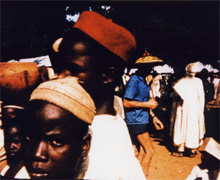Passages (1996)
and déjà vu (1999)
are concerned with issues relating to tourist images. They are found footage, amateur film material about travelling. The material was,
therefore, private and originally intended for showing in a close circle of family and friends, fulfilling many of the same functions as the family album.
Ponger uses the material, however, to tell another story one which is all the darker for its contrast with the coloured brilliance and exoticism of the
images. |
 |
These accounts all begin in Vienna. The descriptions are individual stories of forced Jewish emigration from Austria, refugees fleeing
from Nazi terror. The travelogue-like accounts coolly welded to family films of journeys taken for excitement and pleasure makes the private public and
the public familial. It engenders a claustrophobic horror in the mind. But there is no respite. As the pictures wander the exotic places of the world
they become tainted with the knowledge from the sound-track; the sensual pleasure freezes. At the point when you should be relieved at the escapes of
some, you also remember those who didn’t. At the same time you realise that there are other stories of flights from imprisonment and torture woven in
and on their way back to Vienna. This time they are told by immigrants seeking safety in the West. Specifically in Vienna.
 From the beginning, as the images of déjà vu begin to parade
across the screen, the viewer is seduced into their foreign but nonetheless eerily familiar flow. These are documentary sequences of places and people
but also of our longing for distant lands, colourful events and the 1001 star-pierced tropical nights which no camera can capture. The scenes are strung
together on a crimson thread like the glass trading beads of a bygone era. What happens on the visual level happens too quickly to allow much control,
analysis or argument. From the beginning, as the images of déjà vu begin to parade
across the screen, the viewer is seduced into their foreign but nonetheless eerily familiar flow. These are documentary sequences of places and people
but also of our longing for distant lands, colourful events and the 1001 star-pierced tropical nights which no camera can capture. The scenes are strung
together on a crimson thread like the glass trading beads of a bygone era. What happens on the visual level happens too quickly to allow much control,
analysis or argument. |